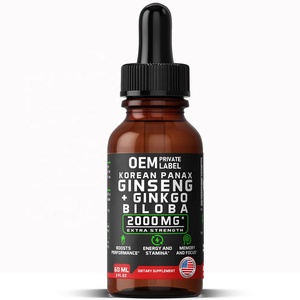
OEM Vegan Korean Red Panax Ginseng+Ginkgo Biloba Root Extract Liquid Drops Strength for Men & Women Energy, Performance & Focus



















Ginkgo nuts are the seeds of the ancient ginkgo biloba tree, native to China and considered a living fossil, as it has no close living relatives and traces back over 200 million years in history. The nuts themselves are encased in a fleshy outer layer, which when ripe, gives off a distinctive, unpleasant odor. Once this layer is removed, the true nut is revealed: a hard-shelled seed with a soft and edible inner kernel.
These kernels have been used in traditional Asian cuisine and medicine for centuries. In culinary contexts, they are prized for their delicate, sweet flavor and their unique texture which is somewhat reminiscent of chestnuts. Traditionally, ginkgo nuts are served at special occasions such as weddings or the Lunar New Year due to their symbolic meanings of longevity and strength.
From a medicinal perspective, ginkgo nuts are believed to have various health benefits, including enhancing lung function, reducing anxiety, and improving cognitive abilities. They contain antioxidants, which may protect cells from damage by free radicals. However, it is important to note that ginkgo nuts should be consumed in moderation as they contain toxins that can be harmful if ingested in large quantities.
The variety of ginkgo nuts available in the market can be categorized based on several factors such as style, use, processing type, cultivation type, and packaging. Each type of ginkgo nut serves different purposes and has its unique characteristics.
Processing types also differ:
Cultivation types include:
Packaging options vary widely:
Selecting the right type of ginkgo nuts for your business needs careful consideration of the aforementioned types. The choice depends on the intended use of the nuts, the preference for organic versus conventional cultivation practices, processing needs (whether raw, blanched or roasted), and packaging requirements.
For culinary businesses focusing on traditional Asian dishes or health-conscious menus, fresh or frozen ginkgo nuts might be preferable due to their higher moisture content and perceived freshness. However, dried ginkgo nuts could be more suitable for establishments with limited storage facilities or those looking to stock up due to their longer shelf life.
When considering organic versus common cultivation types, businesses with a strong focus on natural ingredients would likely opt for organic ginkgo nuts despite potentially higher costs. Conversely, operations prioritizing cost-effectiveness may choose commonly cultivated nuts.
Processing type is another crucial factor – raw nuts offer versatility but require more preparation time; blanched nuts save time but might come at a higher cost; roast nuts add instant flavor and texture but may limit their application in certain recipes.
Lastly, packaging is important from both a logistical and quality standpoint – vacuum packs offer extended freshness but may be more expensive; bulk options like drums or boxes could reduce costs but necessitate proper storage facilities.
For businesses seeking a reliable source of ginkgo nuts in bulk quantities, Alibaba.com provides a comprehensive platform that connects buyers with reputable suppliers from around the globe. Whether your business needs fresh, dried, or frozen ginkgo nuts; raw, blanched or roasted; common or organic cultivation – Alibaba.com offers an extensive selection catering to diverse commercial needs.
Alibaba.com stands out as an international marketplace where businesses can access products tailored to their specifications. Suppliers on Alibaba.com can customize orders based on volume, processing type, packaging preferences – ensuring that each transaction aligns perfectly with buyers' unique requirements.
Furthermore, Alibaba.com's Trade Assurance service ensures that payments remain protected until orders are fulfilled satisfactorily; this commitment to secure transactions bolsters confidence among buyers. With user-friendly features designed for mobile purchasing and multilingual communication support, Alibaba.com simplifies the process of sourcing quality ginkgo nuts for businesses worldwide.
Ginkgo nuts are commonly used in the culinary industry, particularly in Asian cuisine, where they are added to dishes for their unique flavor and texture. They are also utilized in the health food sector due to their purported medicinal properties.
Ginkgo nuts should be stored in a cool, dry place away from direct sunlight. Dried ginkgo nuts can be kept at room temperature, while fresh and frozen varieties should be refrigerated or frozen respectively to maintain their quality.
The shelf life of ginkgo nuts varies by type: dried ginkgo nuts can last for several months when stored properly, whereas fresh ones have a shorter shelf life and should be consumed within a few weeks. Frozen ginkgo nuts can be kept for up to a year if stored at the correct temperature.
Businesses may want to look for certifications such as organic, non-GMO, or fair trade to align with their product standards and values. These certifications can also appeal to certain customer bases.
Yes, ginkgo nuts are available in various grades, such as top grade, food grade, and premium quality. The choice of grade will depend on the intended application and desired quality standards of your business.
Import and export regulations can vary by country and may change over time. It is vital for businesses to check with local authorities and customs agencies regarding any current restrictions or requirements.
Packaging options for wholesale ginkgo nuts include vacuum packs, boxes, drums, and cans. The choice of packaging will depend on the quantity required and storage capabilities.
When purchasing in bulk, it's important to work with reputable suppliers who provide detailed product information and offer samples when possible. Additionally, utilizing services like Alibaba.com's Trade Assurance can help ensure quality and satisfaction.
While allergies to ginkgo nuts are not as common as other nut allergies, they can occur. Businesses should be aware of this potential and clearly label products containing ginkgo nuts to inform consumers with allergies.
Ginkgo nuts are available in several processing types including raw, blanched, and roasted. The choice will depend on the intended use and preference for preparation time versus flavor profile.
Organic ginkgo nuts are grown without synthetic pesticides or fertilizers, which may make them preferable for health-conscious businesses or those targeting organic markets. Common ginkgo nuts may be more cost-effective but do not carry the organic label.
Yes, suppliers on Alibaba.com often offer customizable orders allowing businesses to specify their requirements regarding volume, processing type, packaging preferences, and other specifications.